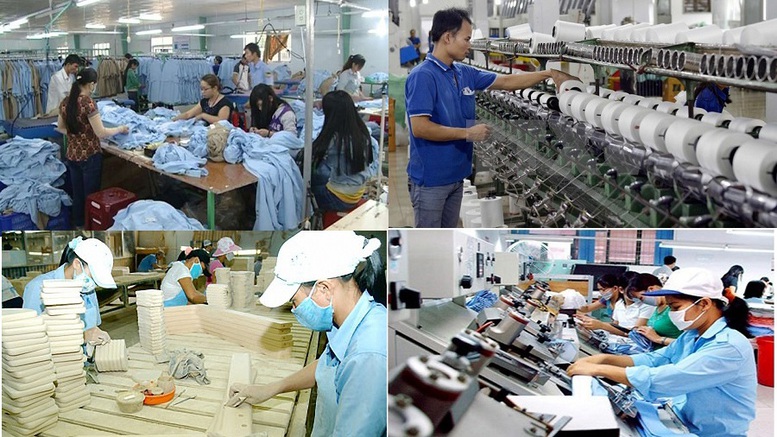
Streamlining business conditions to foster the development of the private sector by December 31, 2025.
In order to promptly implement Resolution No. 198/2025/QH15, the Government requires ministries, sectors, and localities to concretize and vigorously organize the implementation of tasks, in addition to their regular duties.
Streamlining Business Conditions to Foster the Development of the Private Sector
The Government requests ministries, sectors, and localities to improve the business environment and perfect mechanisms and policies related to inspection, examination, licensing, certification, competition, and enterprise bankruptcy.
By December 31, 2025, streamline and remove unnecessary business conditions, overlapping and inconsistent regulations that hinder the development of the private sector. Reduce at least 30% of the time for handling administrative procedures, 30% of compliance costs, and 30% of business conditions, with further significant reductions in subsequent years.
Thoroughly apply digital transformation to maximize the reduction of time, compliance costs, and business conditions in regulations related to market entry and exit, land, planning, investment, construction, taxation, customs, insurance, intellectual property, standards, and norms. Provide public services to businesses and business households regardless of administrative boundaries.
Ensure the realization of the objectives and roadmap specified in the Government’s Resolution No. 66/NQ-CP dated March 26, 2025, on the Program for reducing and simplifying administrative procedures related to production and business activities for the period of 2025-2026. Urgently review business conditions to amend or propose amendments to competent authorities, with the aim of fundamentally transforming business conditions in the form of licenses and certifications into the implementation of business condition declarations and enhancing post-inspection efficiency. Exemptions apply to a few sectors that require licensing procedures as stipulated by international law and practices, with completion expected in 2025 and 2026.
Ministries, sectors, and localities shall review and classify inspection subjects, putting an end to overlapping and prolonged inspections on the same content and field. The number of inspections at enterprises, business households, and business individuals, including inter-sectoral inspections, shall not exceed once a year, except for unexpected inspections with clear signs of violation.
Strictly Handling Acts of Abuse of Inspection Powers to Harass and Cause Difficulties for Enterprises
In the case of the same state management content, if an inspection has been conducted, there shall be no examination or vice versa within the same year, except when there are clear signs of violation.
Strictly handle acts of abuse of inspection powers to harass and cause difficulties for enterprises and business households. Publicly announce inspection plans on portals so that the business community and business households are aware and coordinate accordingly.
Promote online and remote inspections, prioritizing inspections based on electronic data and minimizing direct inspections. Develop and publicize tools and solutions on the units’ websites and portals to provide early warnings to businesses and business households about the risks of legal violations, based on integrated management data and warnings from state management agencies. Direct agencies and units to vigorously combat counterfeit, pirated, smuggled goods, and intellectual property rights violations to protect the legitimate rights and interests of law-abiding enterprises and business households.
The Ministry of Public Security shall complete the draft Decree guiding the Law on Data to enhance data sharing and facilitate online and remote inspections, to be completed by 2025.
The Ministry of Finance shall coordinate with the ministries managing industries to review the list of conditional business lines stipulated in the Law on Investment to study and reduce unnecessary conditional business lines. This task shall be completed by December 31, 2026.
The Ministry of Industry and Trade shall promote the implementation of the Law on Competition and its guiding documents to ensure a fair, equal, and transparent competitive environment among economic sectors. Strictly handle acts of abuse of dominance, monopoly, and unfair competition, and improve the effectiveness of the activities of the National Committee for Competition.
Supporting Access to Land and Production Facilities, and Renting Houses and Land that are Public Assets
The Government assigns the Ministry of Agriculture and Environment to review, amend the Law on Land and its guiding documents, and supplement mechanisms and policies: Control land price fluctuations, especially for production and business land, and non-agricultural land; allocate land for local authorities to invest in industrial park, cluster, and incubator infrastructure for high-tech enterprises, small and medium-sized enterprises, and innovative start-ups; support policies for land rent for the above-mentioned enterprises, to be completed in 2025-2026. Complete the construction of the National Land Database and connect it with the National Data Center and related databases. Promulgate regulations on the management, operation, and exploitation of the National Land Database, to be completed by 2025.
The Ministry of Finance shall review and amend the Government’s Decree No. 35/2022/ND-CP dated May 28, 2022, on the management of industrial parks and economic zones, supplementing mechanisms and policies to allocate a minimum of 20ha/industrial park or 5% of the total land area with invested infrastructure in industrial parks for high-tech enterprises, small and medium-sized enterprises, and innovative start-ups to lease, to be completed by 2025.
Review and amend Decree No. 108/2024/ND-CP dated August 23, 2024, on the management, use, and exploitation of houses and land that are public assets not used for residential purposes, which are assigned to local organizations managing and exploiting houses and land to direct support policies for small and medium-sized enterprises, industrial support enterprises, and innovative enterprises to rent houses and land. This task shall be completed by 2025.
The Ministry of Finance shall submit to the Government a document guiding the policy of supporting high-tech enterprises in the private sector, small and medium-sized enterprises, and innovative start-ups with a reduction of at least 30% in land rent for the first 5 years from the date of signing the land lease contract with the infrastructure investor of industrial parks, clusters, and incubators. This support amount shall be reimbursed by the State to the investor according to the Government’s regulations, to be completed by 2025.
The Ministry of Industry and Trade shall review and amend Decree No. 32/2024/ND-CP dated March 15, 2024, of the Government on the management and development of industrial clusters to supplement mechanisms and policies to allocate a minimum of 20ha/industrial cluster or 5% of the total land area with invested infrastructure in industrial clusters for high-tech enterprises, small and medium-sized enterprises, and innovative start-ups to lease, to be completed by 2025.
Localities shall promptly publicize land use planning and plans, actively coordinate with political and social organizations to support enterprises in site clearance. Thoroughly apply digital transformation to provide online public services in administrative procedures related to land, reducing at least 30% of the time for land lease and granting land use rights certificates to people and businesses.
Financial and Credit Support
The Government assigns the State Bank of Vietnam to submit to the Government a document guiding the policy of the State supporting an interest rate of 2%/year through the system of commercial banks for enterprises in the private sector, business households, and business individuals borrowing capital to implement green, circular projects, and apply environmental, social, and governance (ESG) standards, to be completed by 2025.
The Ministry of Finance shall submit to the Government a document guiding the policy of the State supporting an interest rate of 2%/year through state financial funds outside the state budget for enterprises in the private sector, business households, and business individuals borrowing capital to implement green, circular projects, and apply ESG standards, to be completed by 2025.
Support in Taxes, Fees, and Charges
The Ministry of Finance shall submit to the Government a document guiding the implementation of policies: Exemption from corporate income tax for 2 years and a 50% reduction of payable tax for the next 4 years for income from innovative start-up activities of innovative start-up enterprises, investment fund management companies, and start-up support organizations; exemption from personal income tax and corporate income tax on income from the transfer of shares, capital contributions, the right to buy shares, the right to buy capital contributions in innovative start-up enterprises; exemption from personal income tax for 2 years and a 50% reduction of payable tax for the next 4 years for income from salaries and wages of experts and scientists received from innovative start-up enterprises, research and development centers, innovation centers, and start-up support organizations; exemption from corporate income tax for small and medium-sized enterprises for 3 years from the date of being granted a business registration certificate for the first time; training and retraining costs of large enterprises for small and medium-sized enterprises participating in the chain shall be counted as deductible expenses for determining taxable income when calculating corporate income tax; to be completed by 2025.
The Ministry of Finance shall review, amend, and supplement or report to the competent authorities for amendment and supplementation of legal documents related to the non-application of the tax estimation method for business households and business individuals from January 1, 2026.
The Ministry of Finance shall submit to the Government a document guiding the policy of allocating construction installation packages, purchasing goods, and mixed packages of goods and construction installation services using the state budget with a package value of no more than VND 20 billion to small and medium-sized enterprises, giving priority to enterprises owned by youth, women, ethnic minorities, and people with disabilities, and enterprises in mountainous, border, and island areas, to be completed by 2025.
In addition, the Resolution also states support in scientific and technological research, development, and application, innovation and digital transformation, improvement of enterprise governance capacity and human resource quality, and support in the formation and development of medium and large enterprises, and private economic groups with regional and global reach…
The Power Dialogue: A Summit with the Prime Minister and Business Leaders
On the morning of May 18, at the conference to propagate and implement Resolution 68 of the Politburo on private economic development, in the presence of the highest-ranking leaders of the Party and State, Prime Minister Pham Minh Chinh directly exchanged and addressed a number of opinions and proposals from leaders and representatives of the private business community.
“Overcoming Challenges: Unleashing the Potential of Vietnam’s Private Sector”
“During the National Conference on May 18, Prime Minister Pham Minh Chinh pointed out a slew of shortcomings hindering the development of the private sector, ranging from institutional and cognitive aspects to implementation. Despite accounting for 50% of GDP, this sector still faces a “double bind” in terms of legal framework, credit, and connectivity.”
Unlocking the Potential: Unveiling the Privileges of the Formal Private Sector
With an overwhelming majority of 429 out of 434 votes in favor, the National Assembly has passed a resolution on special mechanisms and policies to promote the private economy.





















